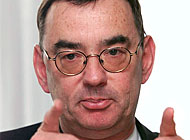
WTO criticises Swiss farm subsidies

The World Trade Organization has criticised Switzerland for failing to reduce subsidies to farmers, in its third periodic review of the country's integration into world markets.
In the report released on Wednesday, the WTO said Switzerland’s efforts to liberalise the agricultural sector had been “unsatisfactory”. It said farmers were still excessively protected.
The report notes that reforms initiated in 1993 had led to less state intervention in agriculture, but had not resulted in any significant cut in subsidies. It said state payments still accounted for three-quarters of gross income in agriculture.
Switzerland rejected the criticism and said it would continue helping farmers. A senior official in the economics ministry, Luzius Wasescha, said on Monday after seeing a copy of the report that every country had the right to an agriculture industry.
But he said it was “frustrating” that Switzerland’s trading partners had not given it any credit for the efforts made over the past few years.
The most vociferous critics are members of the Cairns group of agricultural exporters. They include Australia, Canada and Brazil which no longer subsidise their own farm industries.
Among the worst offences, the Cairns group pointed to the record 678 per cent duty levied in Switzerland on meat imports exceeding the annual authorised quota.
Wasescha admitted that agricultural subsidies were the “Achilles heel” of Switzerland’s economic policy, but said critics were exaggerating their impact. He said 18 per cent of agricultural goods were imported with zero duty, while the average levy was 34 per cent.
Wasescha also defended Swiss export subsidies of $300 million dollars per year, the second highest of any WTO member. He said that – compared to the size of the global market – these payments were not very significant.
The WTO report is the third carried out by the Geneva-based organisation, after reviews in 1991 and 1996. Although more positive about Switzerland’s reforms in other sectors, it is not over-enthusiastic.
The document credits Switzerland with a “certain amount of success” in its liberalisation efforts over the past decade.
It says import duties on industrial goods have fallen on average by 2.3 per cent and that Switzerland is making better use its own comparative trade advantages to increase exports of high-technology products to the United States and Europe.
But the WTO report urges Switzerland to do more to open up its energy market and do away with monopolies in other sectors, such as postal services and rail and air transport.
It said the high cost of living in Switzerland was mainly due to the high prices in the protected industries.
swissinfo with agencies

In compliance with the JTI standards
More: SWI swissinfo.ch certified by the Journalism Trust Initiative

























You can find an overview of ongoing debates with our journalists here . Please join us!
If you want to start a conversation about a topic raised in this article or want to report factual errors, email us at english@swissinfo.ch.